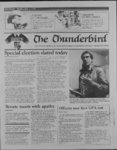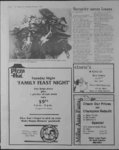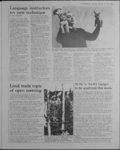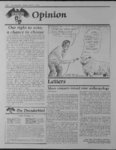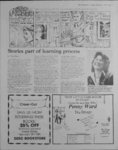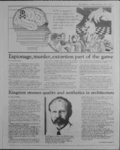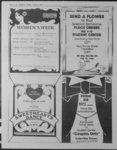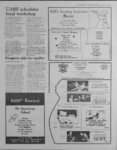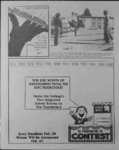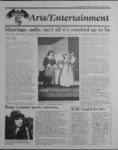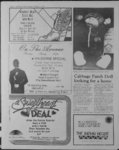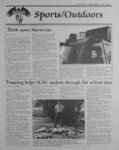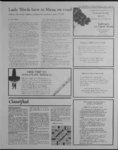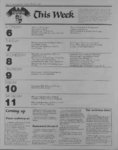| OCR Text |
Show Page 4 The Thunderbird M onday, February 6, 1984 Our right to vote ; a chance to choose The ASSUSC Senate recently passed a bill that would restructure the campus legislature; the bill will now go before the student body. A simple majority of those voting can either ratify or kill it. Hypothetically, if only three people voted on this important issue, a single person could determine how the students of SUSC will be represented in their government in succeeding years. The question is, how many people will take the time and effort to vote. According to ASSUSC President Mark Wade, only a third of the student body voted in the 1983 general elections. Only 250 people approximately one tenth of the student body voted in the October elections for attorney general and freshmen senators. Why are SUSC students so apathetic about political participation? Do we feel that our opinions have no value with our representatives, even when we are offered a chance to choose our own policy? Or is it just easier to let others make the decisions, as long as we dont directly feel the consequences of their actions? In all fairness, one could realistically argue that the question of restructuring the campus government is After all, neither the current hardly nor the proposed arrangement is likely to double student activity fees, alter graduation requirements, guarantee jobs to graduates or in any other way seriously affect students lives through major concerns. In fact, the new changes will only redistribute some organizational responsibilities to ensure the club allocations and social affairs are processed more quickly right? The ASSUSC does more than just supply a dance every Friday and represent the college at leadership conferences; it is a forum for our complaints and our ideas for reform and expansion. An active, concerned, responsible student body can help create a better educational and social environment for everyone on campus. An uncaring, uninformed constituency can only retard our growth. The vote is our chance to choose. Lets use that chance. earth-shatterin- g. Che More concern voiced over anthropology the editor: To We, some of the students with an Anthropology minor, wish to heartily concur with and applaud the letter to the editor in the January 23, 1984 issue of The Thunderbird. Ms. Cedarface is to be commended for her outstanding summary of the merits and accomplishments of Dr. Richard Thompson. We feel there is perhaps no academic discipline of more Chunderbird THE STUDENT NEWS AND VIEWS OF SOUTHERN UTAH STATE COLLEGE CEDAR CITY. UTAH Volume 78; Number 18 Editor Tamara Rumbaugh Associate Editor Lynn Nolan Copy Editor Vicki Baxter Photo Editor Anthony Ford Sports Editor Stewart Smith , quote Entertainment Editor Stacey Smith Senior Staff Writer Fletcher Matson Production Manager Donna Messerly Advertising Manager Scott Mitchell (Faculty Adviser Larry Baker The Thunderbird is published each Monday of the academic year by and for the student body of Southern Utah State College. The views and opinions expressed in The Thunderbird are the opinions of the publications individual writers and do not necessarily reflect the views and opinions of the institution, faculty, staff or student body in general. The unsigned editorial directly above is the opinion of The Thunderbird as a single entity. Letters to the editor must include the name, student number (if from a student) and phone number. Only the name will be printed. Names will not be withheld under any circumstances and the editor reserves the right to edit letters for length and to preclude libel. Letters must be submitted by noon Friday for inclusion in the following weeks edition. The Thunderbird: editorial and advertising offices at 529 West 200 South, Cedar City, UT 84720. Mail at SUSC Box 384, Cedar City, UT 84720. (801) inherent interest to people than Anthropology. After all, Anthropology is the study of humanity its physical evolution, its varied cultures, its languages. In addition to the less from this institution of a true scholar, Dr. Thompson, we are very concerned with the loss of the information and understanding provided only through his Anthropology courses. A , from the Preliminary Accreditation Report Site Visit (page 29) voices that committees concerns: The elimination of Anthropology, in spite of cost efficiency is hardly understandable. The geographical location of SUSC, with its rich anthropological sites, would seem to make Anthropology a vita! discipline. A reconsideration of its discontinuance seems to be in order. The study of many cultures is of vital importance to those persons pursuing careers in social work, sociology, education, history, and political science as well as archeology. The interrelatedness of the whole social science curriculum and its dependence on the world of Anthropology cannot be underexpressed. We are told that the college experience should be well rounded, covering a variety of disciplines. In this sense, it is ironic that the most important social science area cultural awareness is being set aside by the administration. Historical implications show that cultural misperceptions have caused international conflicts, not to mention conflicts of the various cultures that exist in this great melting pot. The Anthropology discipline not only has relevance to cultural understanding, but historical knowledge as well. The archeological work done by the department with the modest funds it works with is phenomenal. The department produces the minor program and also the archeological field school (which draws students from across the United States) as well as the study of virtually all prehistoric Native American sites identified in southwestern Utah, We feel it would be wise if the administration would rfealize the major setback that will be cased if Anthropology is eliminated. The knowledge it i i provide is extremely valuable in working with people land, hopefully, fostering an attitude of understanding and acceptance and the reduction of prejudice in our world. The Anthropology discipline is economically efficient and it poses no great burden on the administration. It is evident that the elimination of Anthropology must be reconsidered. We are concerned with the future of this institution its goals, objectives and priorities. Is SUSC to be an academic institution or not? Stuart Riley, Elvis Wall, Todd Prince, DeNean Petersen, Teneil Hooper, Anne Marie Nicholson, Jacque Nielson |

